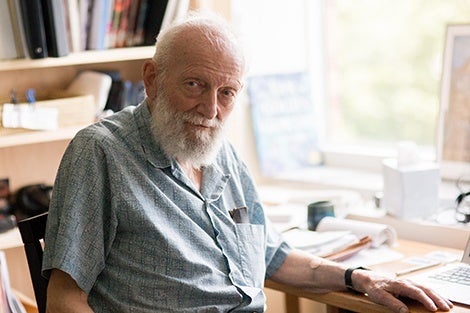October 15, 2015 — Richard Levins, John Rock Professor of Population Sciences at Harvard T.H. Chan School of Public Health, has been known throughout his lengthy career for his ability to make connections between seemingly disparate topics such as biology and political theory. An ex-tropical farmer turned ecologist, biomathematician, and philosopher of science, Levins describes the subject matter he teaches as “looking at the whole.”
Friends and admirers organized a symposium earlier this year to mark Levins’s 85th birthday and honor a career that has included 40 years at Harvard Chan School. Rather than a traditional event focused around a single topic, researchers presented work that was not obviously related. From the neurobiology of autism to insect communities around a Central American coffee plantation, the underlying theme was research approached with an eye for complexity.
“Biology has become molecular biology and graduates are less likely to tramp through a forest or sniff the earth. They may not even know anything about the animals they study, just the tissue extract,” Levins said. “So throughout my career I have encouraged students to look at such things as connections between human activity and forests, and changes in human population and agriculture. The history of disease shows the co-evolution between us and microorganisms, so we take a step back and look at that complexity.”
Levins argues that public health professionals can run into trouble when they don’t look at the bigger picture. He notes that for a brief period in the 20th century, some researchers believed that the emergence of antibiotics and vaccines heralded a new age in which infectious diseases could be stopped in their tracks. This optimism was dashed by a wave of globally emerging infections including HIV, Ebola, and West Nile virus.
“You can’t just look at humans if you want to understand infectious diseases,” Levins said. “Organisms evolve. When we invent something, so do the bugs.”
In the early 1990s, Levins and others formed the Harvard Working Group on New and Resurgent Diseases. Their work showed that the alarming new infections had sprung from changes in the environment, either natural or caused by humans.
When studying an environment, Levins says he has always tried to see the “point of view” of the organisms involved and understand the reasons why they react the way they do. Much as he has encouraged biology students to see a forest from a tree’s perspective, he hopes future students who want to change human behavior to promote health will consider how the world looks through the eyes of the people they are trying to influence.
Read more
The Truth is the Whole — site includes videos of the symposium presentations and archival material
Dialectics of Disease (Harvard Public Health Review)
Photo: Emily Cuccarese
